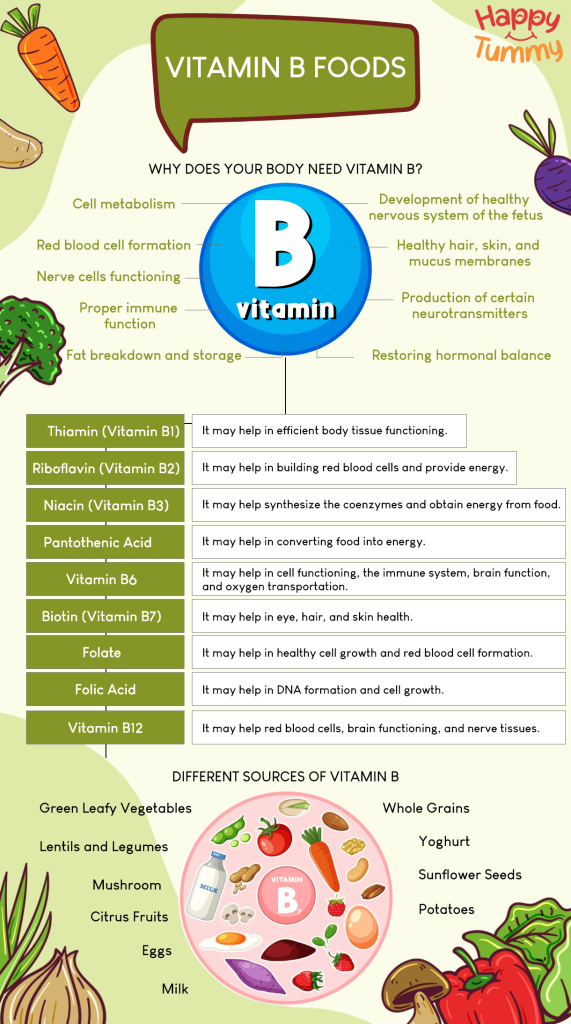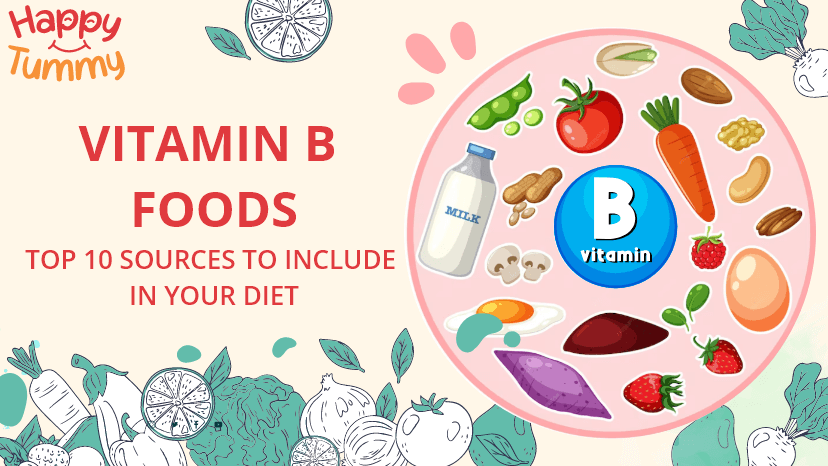Table of Contents
Do you know that vitamin B is necessary for the body to produce energy, for the brain to operate, and also to improve general health?
Including a range of foods high in Vit B may help you get the necessary nourishment.
Whole grains, leafy greens, eggs, dairy, legumes, nuts, seeds, meat, fish, and fortified cereals are a few of the best sources.
Diverse B vitamins, including B1 (thiamine), B2 (riboflavin), B6 (pyridoxine), and B12 (cobalamin), are present in these meals, which can support and improve diverse body functions.
Meals that incorporate these nutrient-dense selections may improve your overall health and well-being. Let’s find out more about the top 10 food sources.
Different Types of Vitamin B
The different kinds of vitamin B are listed below:
| Thiamin (Vitamin B1) | Riboflavin (Vitamin B2) | Niacin (Vitamin B3) |
| Pantothenic Acid | Vitamin B6 | Biotin (Vitamin B7) |
| Folate | Folic Acid | Vitamin B12 |
Why Does Your Body Need Vitamin B?
Your body needs vitamin B for many different purposes, such as converting food into energy [1]. Some other uses of vitamin B are:
- Cell metabolism
- Development of a healthy nervous system of the foetus
- Red blood cell formation
- Nerve cells functioning
- Healthy hair, skin, and mucus membranes
- Production of certain neurotransmitters
- Proper immune function
- Restoring hormonal balance
- Fat breakdown and storage
Besides B12, our bodies cannot store other types for long. Hence, you need to replenish them through different food sources [2].
Let’s look at the role of different types of vitamin B in your health [3]:
| Vitamin B | Benefits |
| Thiamin (Vitamin B1) | It may help in efficient body tissue functioning. |
| Riboflavin (Vitamin B2) | It may help in building red blood cells and provide energy. |
| Niacin (Vitamin B3) | It may help synthesize the coenzymes and obtain energy from food. |
| Pantothenic Acid | It may help in converting food into energy. |
| Vitamin B6 | It may help in cell functioning, the immune system, brain function, and oxygen transportation. |
| Biotin (Vitamin B7) | It may help in eye, hair, and skin health. |
| Folate | It may help in healthy cell growth and red blood cell formation. |
| Folic Acid | It may help in DNA formation and cell growth. |
| Vitamin B12 | It may help red blood cells, brain functioning, and nerve tissues. |
Different Sources of Vitamin B
There are different sources for different types of vitamin B, and many of them are animal sources, including dairy, fish, and meat.
Some other natural sources include vegetables, fruits, and nuts. Hence, a balanced diet may give you all the nutrients you need to stay healthy [4].
You can contact Aashirvaad’s expert dieticians to discuss the best source of Vit B food for your needs.
Top 10 Food Sources of Vitamin B

Although many food sources can offer you vit B, here are the top 10 for your reference:
#1. Whole Grains
Most nutrients are removed from the grains once they are processed. Hence, eating whole grains may help you get the proper nutrients [5].
Some excellent vitamin B sources of whole grains are brown rice, millet, and barley. You can also consider Aashirvaad’s multi-millet flour to your diet to meet your Vit B requirements.
#2. Vitamin B rich Yoghurt
Yoghurt contains a good amount of B12 and riboflavin. Besides, Greek Yogurt is considered to have the most amount of these nutrients compared to standard one [6].
Non-dairy yoghurts prepared using soy, almond, or coconut milk may not have the same level of vit B present in them.
#3. Eggs
There are many different vitamin B that you can get by including eggs, particularly the yolk, into your diet [7].
They are also the most beneficial food as they are natural sources of many nutrients, such as iron, vitamin D, and Choline.
A few vit B in eggs are riboflavin, B12, pantothenic acid, folate, and biotin.
#4. Green Leafy Vegetables
Green leafy vegetables, such as kale, spinach, turnip greens, and collard greens, are an excellent source of folate (vitamin B9), which women need. Women tend to experience anemia because of blood loss during menstruation and childbirth. Green leafy vegetables are also necessary during lactation as they can help produce breast milk.
Besides, these veggies are loaded with B1, B2, B3, and B6. You can include them as salads, stir-fries, smoothies, and side dishes [8].
#5. Vitamin B rich Lentils and Legumes
Lentils and legumes are of different kinds and are a rich source of vitamin B, especially folate, compared to other unfortified plant-based food.
A single serving of lentils can provide almost the daily required folate [9]. Some of the best legumes and lentils to include are black beans, green peas, kidney beans, etc.
#6. Vitamin B-rich Milk
Milk, a dairy product, contains different vitamins, including vitamin B12 and riboflavin (B2). It is also a complete diet in itself and the best source of B12 [10].
#7. Potatoes
This vegetable is also an excellent Vit B source. It includes several types, like B1, B3, and B6, and other nutrients, such as magnesium, potassium, and phosphorus [11].
#8. Vitamin B-rich Mushroom
This vegetable is an easy way to get vit B, like B5, B2, and B2 in your diet. Besides, they also contain Biotin and B9 and many other essential nutrients good for overall health [12].
#9. Citrus Fruits
Citrus fruits like lemon, clementine, and oranges are excellent sources of Vit B, especially folate acid.
There are other vitamin B also present in them. However, the ration of folate acid is higher than others [13].
#10. Sunflower Seeds
Sunflower seeds are an excellent source of vitamin B and are free from common allergies.
These seeds can provide niacin, folate, vitamin B6, and pantothenic acid. You can also find biotin, vitamin E, copper, magnesium, and zinc [14].
Recommended Doses of Vitamin B
The table below describes the daily requirement of the different vitamin B levels in our body [15]. The RDA for Vitamin B depends on various factors such as Gender, physical activity levels, and physiological conditions such as during pregnancy, lactation, etc.
| Nutrient | Men | Women |
| Thiamine (mg /d) | 1.4-2.3 | 1.4-2.2 |
| Riboflavin (mg /d) | 2.0-3.2 | 1.9-3.1 |
| Niacin (mg /d) | 14-23 | 11-18 |
| Vit B6 (mg /d) | 1.9-3.1 | 1.9-2.4 |
| Folate (µg /d) | 300 | 220 |
| Vit B12 (µg /d) | 2.5 | 2.5 |
Vitamin B12 Deficiency
Symptoms of vitamin B12 deficiency might include neurological and hematologic disorders. It may also lead to the lowering of red blood cells.
People may experience breathlessness, fatigue, and pallor. Jaundice may also emerge as a symptom because of the increased hemolysis brought on by the decreased production of red blood cells.
Peripheral neuropathy, glossitis, diarrhoea, headaches, and mental disorders may also be possible additional presenting problems [16].
Conclusion
Maintaining good health requires a diet rich in a range of foods high in Vit B. Lean meats, eggs, dairy products, legumes, seeds, nuts, whole grains, leafy greens, fish, and fortified cereals are all sources to consider.
A wide variety of B vitamins are included in these foods that may support brain function, cell metabolism, and energy generation.
These nutrient-dense selections may help you satisfy your body’s demands and encourage general health when you include them in your meals.
By including these sources in your diet, you may increase the amount of the B Vit complex you get.
FAQs
There is no Vit B complex deficiency. Instead, it is vitamin B deficiency. The deficiency and symptoms depend on which specific vitamin B deficiency the individual is experiencing.
For example, vitamin B9 deficiency may cause heart palpitations and headaches, and Vit B2 deficiency may cause hair loss and cracked lips.
Meat, fish, eggs, dairy products, and some fortified cereals are examples of animal-based foods that include Vit B. Try to consume a wide range of fresh, unprocessed foods, such as meat and other proteins, dairy, grains, fruits, and vegetables, to have a diet rich in B vitamins.
Fruits like bananas, avocados, and apples are rich in B vitamins. Vit B is also abundant in citrus fruits.
Vit B12 food sources consist of a wide range of foods high in protein, including seafood, eggs, poultry, lean meats, beans, peas, lentils, nuts, seeds, and soy.
Vitamin B9 can be found in dark leafy vegetables, seafood, beans, liver, peanuts, whole grains, sunflower seeds, and fresh fruits.
















